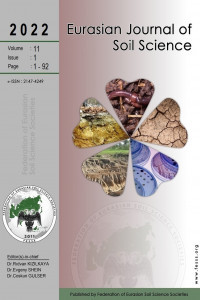Irrigated common bean (Phaseolus vulgaris L.) performance on calcareous alkaline soils as influenced by previous crops in North of Sudan
This
study examines the ability of different cropping sequence (including or not including alfalfa) to
improve bean productivity in calcareous and alkaline soils of the old Nile (high) terraces in North of Sudan. The soil in the experimental
site is sandy clay to sandy clay loom. Soil properties were examined before
planting and after bean harvest. Salinity which was
greater in non-reclaimed soil decreased regardless of the cropping sequence.
Soil alkalinity remain higher than 8 in all cropping sequence after more than
6-7 cropping seasons. P (Olsen) and calcium
carbonate showed inconsistent trends regardless of the cropping
sequence. Organic carbon increased after bean
cultivation in both cropping sequence. Change in growth parameters as
affected by cropping sequence were significant
in various levels, however, that determining yield were not. Presence of
alfalfa in the cropping sequence increased seed yield, number of pods per
plant, number of seeds per pods, pod length, plant length, leaf length, leaf
width, fresh plant weight, nodule number. However seed weight was decreased.
Keywords:
Alfalfa, calcareous soils, common bean, cropping sequence Sudan,
___
- Attar, H.A., Blavet, D., Selim, E.M., Abdelhamid, M.T., Drevon, J.J., 2012. Relationship between phosphorus status and nitrogen fixation by common beans (Phaseolus vulgaris L.) under drip irrigation. International Journal of Environmental Science and Technology 9(1): 1–13.
- Buursink, J., 1971. Soils of central Sudan. Grafisch Bedrijf Schotanus & Jens Utrecht N.V. 248p.
- Ceyhan, E., Kahraman, A., Avci, M.A., Dalgic, H., 2014. Combining ability of bean genotypes estimated by line x tester analysis under highly-calcareous soils. The Journal of Animal & Plant Sciences 24(2): 579-584.
- Elhagwa, A, Richter, C., Gedamu, A., 2007. Properties of new reclaimed soils in the Merowi irrigation project of North Sudan. Journal of Agriculture and Rural Development in the Tropics and Subtropics 108(2): 113–121.
- Elhagwa, A., 2010. Climatic variation and its effect on general properties of soils of Sudan. The Fourth International Conference on Agriculture and Rural Development. Saudi Society for Agricultural Sciences. Faculty of Science of Food and Agriculture, King Saud University, 4-7 April 2011, Hail, Saudi Arabia [in Arabic].
- Estefan, G., Sommer, R., Ryan, J., 2014. Analytical methods for soil-plant and water in the dry areas. A Manual of Relevance to the West Asia and North Africa Region. 3rd Edition, International Center for Agricultural Research in the Dry Areas, Aleppo, 255 p.
- Ibrahim, M.M.M., Dafalla, M.S., Elhag, A.M.H, Ibrahim, I.S., 2013. Monitoring, predicting and quantifying soil salinity, sodicity and alkalinity in Sudan, using soil techniques, remote sensing and GIS Analysis, Case study: University of Khartoum top farm. International Journal of Scientific and Research Publications 3(3): 1-7.
- Leytem, A.B., Mikkelsen, R.L., 2005. The nature of phosphorus in calcareous soils. Better Crops 89 (2): 11-13. Available at [access date: 23.08.2017]: https://eprints.nwisrl.ars.usda.gov/14/1/1159.pdf
- Michiels, J., Dombrecht, B., Vermeiren, N., Xi, C., Luyten, E., Vanderleyden, J., 1998. Phaseolus vulgaris is a non-selective host for nodulation. FEMS Microbiology Ecology 26(3): 193-205.
- Patel, D.H., Milan, M., 2013. Study of presence of available phosphorus in soil of Kalol-Godhra taluka territory. Archives of Applied Science Research 5(4): 24-29.
- SAS Institute Inc. 2003. SAS/STAT User’s Guide, Version 9.1.
- Vargas, A.A.T., Graham, P.H., 1988. Phaseolus vulgaris cultivar and Rhizobium strain variation in acid-pH tolerance and nodulation under acid conditions. Field Crops Research 19: 91–101.
- Yayın Aralığı: Yılda 4 Sayı
- Başlangıç: 2012
- Yayıncı: Avrasya Toprak Bilimleri Dernekleri Federasyonu
Sayıdaki Diğer Makaleler
Maneyahilishal TEFERA, Ftsum GEBREYOHANNES, Mekala SARASWATHİ
Naveen Ch. PANDEY, Lalit M. TEWARİ, G.c. JOSHİ, Brij M. UPRETİ
Abdel Wahab Ahmed Mohamed AHMED, Mohammed Abdalla ELSHEİKH, Yousif El Gorashi EL MAHİ
Justin George KALAMBUKATTU, Suresh KUMAR, Yogesh S. GHOTEKAR
Endalkachew FEKADU, Kibebew KİBRET, Bobe BEDADİ, Asmare MELESE, Birru YİTAFERU
Salah Hassanien ABD EL-AZİZ, Mohsen A. GAMEH, Ahmed GHALLAB
Ali Bagherzadeh, Amin Gholizadeh, Ali Keshavarzi
Selvam RAMARAJAN, Sugumar SUSİLA, Duraisamy TAMİLSELVİ, Muthunarayanan VASANTHY
